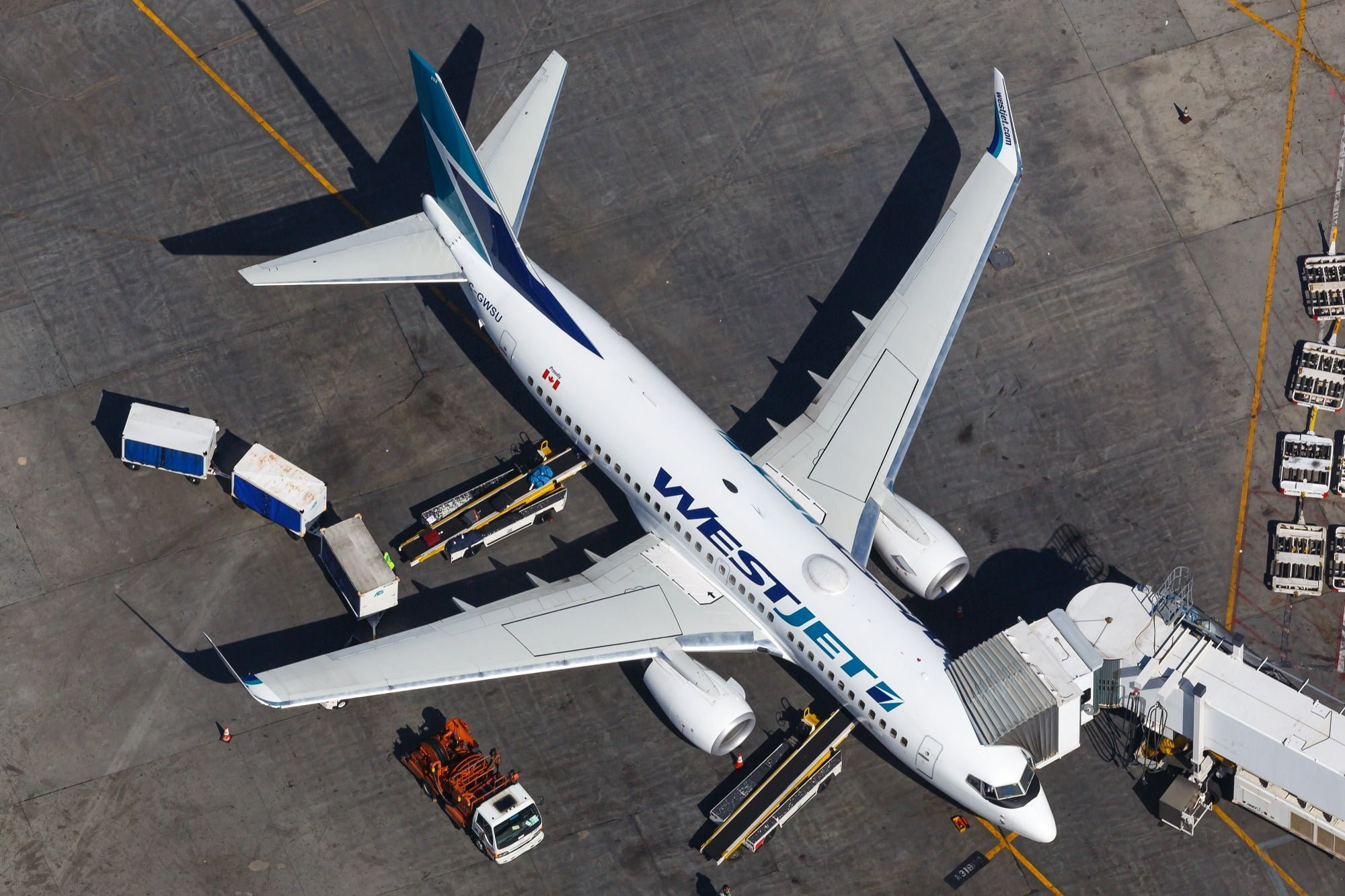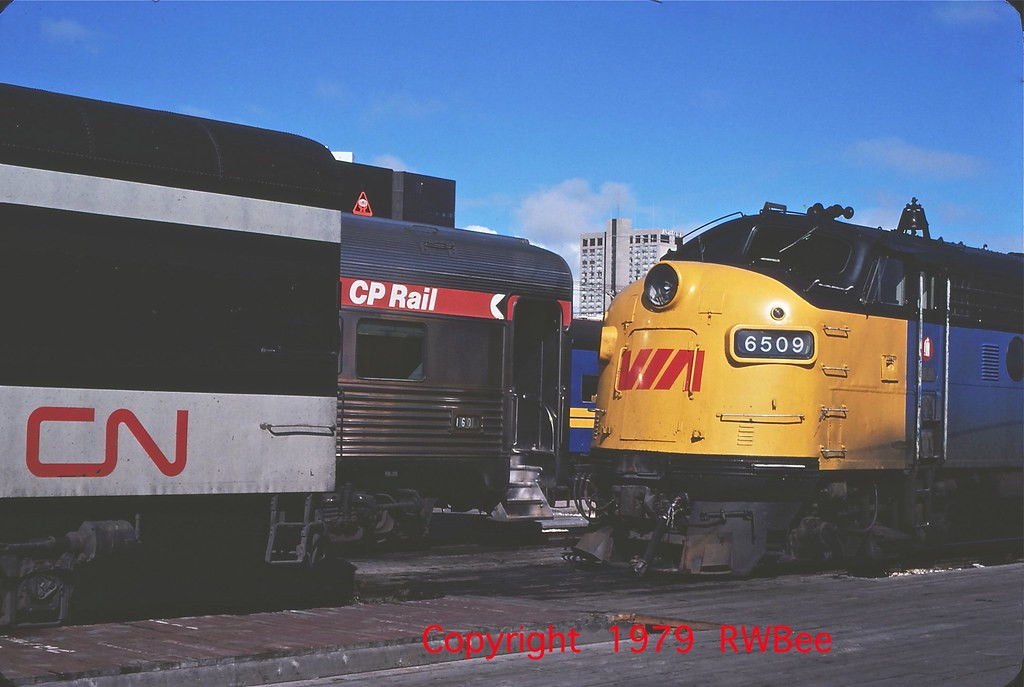A labour dispute between Canada’s two main national rail carriers and workers could lead to a possible lockout as soon as Thursday morning, threatening crucial supply chains across North America.
Canadian National Railway (CN) and Canadian Pacific Kansas City (CPKC) plan to lock out nearly 9,300 workers as of 00:01 EST (04:01 GMT) failing an eleventh-hour deal.
Canada sends around 75% of all the goods it exports to the US, mostly over rail, and a prolonged dispute could disrupt shipments of a wide range of goods, from grains and beans to potash, coal and timber.
Negotiations have stalled over shift scheduling, fatigue provisions and wages.
On Wednesday, Prime Minister Justin Trudeau urged both sides to continue talks.
“Millions of Canadians, of workers, of farmers, of businesses right across the country are counting on both sides to do the work and get to a resolution,” he said in brief remarks, without taking questions.
Dozens of industry and trade organisations warned last week in an open letter that the disruption would have “an immediate impact” from coast-to-coast and damage Canada's reputation as a trading partner.
“Factoring in the millions of Canadian jobs that would be impacted, the magnitude of the disruption is daunting,” it said.
On Tuesday, a joint statement from the US and Canadian chambers of commerce warned of the potential “devastating” impact of the stoppage.
It “will be devastating to Canadian businesses and families and impose significant impacts on the US economy”, they said.
Impact on the Supply Chain
A group of agriculture trade associations has urged Ottawa to step in, but the government has declined so far.
Federal Labour Minister Steve MacKinnon is meeting both sides this week but has resisted calls for binding arbitration.
Labour agreements for both railways expired at the end of last year.
Both CPKC and CN have told the union they will begin locking out members on Thursday. Teamsters Canada Rail Conference separately issued a 72-hour strike notice to CPKC on Sunday.
Rail networks in the US and Mexico will continue to operate but a stoppage north of the border could be felt across North America.
On Monday, US Transport Secretary Peter said on X/Twitter that he is monitoring rail negotiations and the potential impact on the cross-border flow of goods.
Some C$380bn (£214bn) in goods is moved by rail each year and railways move half of the country’s goods for export, according to the Railway Association of Canada.
This week, both CPKC and CN have already begun pausing some shipments in preparation for a stoppage. Embargoes are now in place on chemicals such as ammonia, used as a fertiliser, and chlorine, used in water treatment, to avoid them being stranded on the rails if work stops.
Shipping firm Maersk on Monday stopped accepting shipments destined for Canada meant to move by rail and that could not be transported on heavy trucks instead.
The Canadian Pork Council warned that since the industry relies on rail to get feed to its animals, their welfare is at risk.
“Canada’s red meat processors need stable, reliable supply chains to run their businesses,” said Chris White, CEO, Canadian Meat Council in a statement.
“Interruption in service will result in millions of dollars in losses, irreversible reputational damage, environmental disposal challenges, and enormous waste.”
Trucking Industry’s Dilemma
The shutdown could also snarl commuter transit in major Canadian cities like Toronto or Montreal as some dispatchers will be on a work stoppage.
Professor Barry Prentice, director at the University of Manitoba Transport Institute, said the government would likely pass back-to-work legislation in the coming days if the sides couldn't come to an agreement, as has been done in similar past disputes.
“This isn't the best way to run the show,” he told the BBC.
“But it seems to be the playbook and and we're back on this merry-go-round again,”
The British Columbia Trucking Association’s CEO says a shutdown of Canadian railroad networks will lead to a dearth in trucking activity.
“There is no possibility trucking can fill the gap of any labour disruption on railways,” Dave Earl, president and CEO of the BCTA, said in an email to Trucking Dive.
Earl recognizes the dire situation and impact to supply chains should Canada’s railroads stop running. More than 900,000 metric tons of goods move daily on Canada’s railways, according to the Railway Association of Canada.
Despite the soft freight market plaguing the U.S. trucking industry, Canada’s trucking industry is “already running near capacity,” Earl said, adding that “road transportation cannot come close to replacing the movement of goods that will be displaced from railways in the event of a dispute.”
BCTA’s motor carrier members operate between 13,000 and 14,000 trucks and employ over 26,000 people. Trucking depends on the railroads to haul bulk items including raw materials such as coal, grain and other minerals, Earl said.
“Our members move goods in smaller quantities to places railways don’t go,” Earl said.
U.S. trucking companies that operate in Canada are aware of a possible logistics crisis. A spokesperson for ArcBest said the carrier doesn’t expect Canadian rail disruption to impact its operation since most of its freight in Canada is transported over the road but stands prepared to handle any issues if problems arise.
Potential Impact on Businesses and Consumers
He pointed to shipments of new vehicles arriving through the Annacis Auto Terminal at the Port of Vancouver, Canada’s largest, which handles 480,000 vehicles annually. Earl said if cars cannot move from the Annacis terminal on rail, eastern-based vehicle transport carriers will have nothing to deliver to dealerships.
The same scenario arises for shipping containers arriving in Vancouver, Earl said. If cargo typically transported to eastern and southern destinations in Canada isn’t moved on rail, distribution centers won’t be restocked, which means trucking companies have nothing to transport to stores for consumers to purchase.
“Far from an uptick in business, this will create significant disruption,” Earl said. Trucking may manage some of the displaced cargo, but he doesn’t see rail disruption creating a “boon for our sector.”
“Should a disruption occur, this will impact every element of the supply chain in Canada,” Earl said.
Canada's Economic Lifeline at Risk
Canada’s miners, grain exporters and large retailers are braced for lockouts or strikes at both of the country’s big freight railways.
Canadian National Railway Co. CNR-T and Canadian Pacific Kansas City Ltd. CP-T have issued lockout notices for early Thursday morning amid tense labour negotiations with the Teamsters union representing almost 10,000 train workers. The Teamsters have also issued a Thursday strike notice at CPKC, raising the odds of a stoppage that would strand grain, ore and a vast range of goods.
There are no real alternatives to freight trains – trucks are too small and few in number, and shippers usually have no means to switch railways because of track locations – assuming both are not shut down. A work stoppage at CPKC would also halt some commuter trains that serve Montreal, Toronto and Vancouver.
“A strike for the supply chain is going to be devastating,” said John Corey, president of the Freight Management Association of Canada, which represents dozens of companies that rely on the railways. These include Home Depot, Canadian Tire, miners and ports.
For several days, both railways have been winding down operations ahead of a possible shutdown, ceasing to pick up some loads in order to ensure goods are not stranded and trains are safely parked. U.S. railways have also stopped sending goods to Canada and interchanging cars with CN and CPKC.
Jim Vena, chief executive officer of Union Pacific Railroad UNP-N, said this has already affected the Omaha, Neb.-based company’s operations and customers. “Anything that is ready to be shipped cannot be shipped to Canada,” he said by phone.
Mr. Vena, who worked at CN for 40 years before taking the top job at the second-biggest U.S. railway, said worries about the possible shutdown have driven some freight away from Canadian to U.S. ports, and halted some commodities. “It’s not good,” Mr. Vena said. “It’s not a win-win for anybody.”
Most industrial companies do not have much on-site storage for raw materials and finished goods, and they count on regular railway service to operate, Mr. Corey said. A pulp mill or chemical plant that cannot ship to customers will be forced to close and lay off employees, he said. Similarly, retailers have warehoused inventories but count on seasonal deliveries.
“If the railways both go out on Thursday, the ports of Vancouver, Montreal and Halifax have got maybe two days before they shut down because the boxes that are piling up there will not be able to leave and anything that goes to the port won’t be able to exit,” Mr. Corey said. “So all our imports and exports come to a standstill.”
Business groups say Canada’s railways ship $380-billion worth of goods a year, and they have urged the federal government to take action to prevent costly stoppages. Bulk commodities such as crops and coal comprise much of the freight moving on Canada’s railways. However, the companies also ship high-value products that include autos and containers of consumer goods from Asia.
“People do underestimate the importance of the railways,” said Barry Prentice, a transportation professor at the University of Manitoba. Still, “the average Canadian isn’t going to see very much [impact] because most of what they purchase is delivered by truck. The people who will feel it are people who are shipping commodities, farmers and people working in the forest industries and others.”
The Canadian Chamber of Commerce and the U.S. Chamber of Commerce called on Ottawa to intervene and prevent a “devastating” shutdown of rail service. “Significant two-way trade and deeply integrated supply chains between Canada and the United States mean that any significant rail disruption will jeopardize the livelihoods of workers across multiple industries on both sides of the border,” the groups said in a joint statement. “The government of Canada must take action to ensure goods continue to move reliably between our two countries.”
Labour Minister Steven MacKinnon was in Montreal on Tuesday evening to meet with CN, Teamsters and federal mediators, and set to be in Calgary on Wednesday to talk with the CPKC parties. Mr. MacKinnon said on social media that his message will be, “Get a deal at the table. Workers, farmers, businesses and all Canadians are counting on it.”
Mr. MacKinnon last week refused a CN request to direct the Canadian Industrial Relations Board to lead binding arbitration in the disputes, a measure that could prevent or delay stoppages.
Prof. Prentice predicted the government would not allow a strike or lockout to last more than seven to 10 days, using back-to-work legislation and sending the parties to arbitration.
A Complex Negotiation
TORONTO (AP) — Businesses across a variety of industries are bracing for freight trains to stop moving Thursday at both major Canadian freight railroads if they can’t resolve a contract dispute with the union that represents engineers, conductors and dispatchers.
The impact will be widespread because so many companies rely on Canadian National and CPKC railroads to deliver their raw materials and finished products. Railroads carry more than $1 billion Canadian (US$730 million) worth of goods each day and delivered more than 375 million tons of freight last year.
More than 32,000 commuters will also be affected in Toronto, Montreal and Vancouver because they rely on CPKC dispatchers to direct those trains over that freight railroad’s tracks.
Government officials are playing a more active role in trying to resolve the dispute, with the labor minister meeting with the parties at the CN negotiations in Montreal on Tuesday and with CPKC contract negotiators on Wednesday in Calgary. But so far, Prime Minister Justin Trudeau has been reluctant to force the Teamsters Canada Rail Conference union to accept a deal. Many business groups have urged the government to intervene and force arbitration.
Both railroads are offering raises to what are already well-paying jobs that they say are consistent with other recent deals in the industry. The negotiations are primarily hung up on issues related to the way rail workers are scheduled and concerns about rules designed to prevent fatigue. At CN, there are some additional concerns about provisions that would help the railroad temporarily relocate workers when it is short in other regions.
Nearly 10,000 workers are covered by these contracts. CN said its engineers make about $150,000 a year while conductors earn about $120,000, and CPKC says its pay is comparable.
Two years ago, quality-of-life concerns about demanding schedules and the lack of paid sick time drove U.S. railroads to the brink of a strike before Congress and President Joe Biden intervened and forced the unions to accept a deal.
Businesses in Canada are especially concerned because CN and CPKC are slated to shut down simultaneously Thursday at 12:01 a.m. EDT. Past labor disputes have sometimes stopped the trains at just one of the railroads for a brief period — most recently in March 2022 at CPKC — but not both at the same time.
“Nobody can go very long without a constant source of supply, and a lot of commodities are shipped by rail,” said Dan Kelly, president of The Canadian Federation of Independent Business.
Losing rail shipments would be especially painful for companies that rely on bulk shipments over long distances because there is no way for trucks to make up the difference. Chemical manufacturers, refineries and exporters of grain and fertilizer are especially dependent on rail. And many consumer goods travel by rail once they are unloaded off massive ships.
All rail traffic in Canada and any rail freight that goes into or out of the United States will stop moving if a lockout or strike occur, but the railroads’ numerous trains within the United States and Mexico will continue operating.
A Ticking Clock for Key Industries
A few examples of the potential impact:
-
The railroads stopped accepting new shipments of hazardous materials to ensure that none of those dangerous commodities would be stranded along the tracks if the railroads shut down. Shipments of perishable goods were also put on hold early. All other shipments are being gradually halted before Thursday.
-
Depending on how many supplies they have on hand and how much storage space they have for finished products, some chemical plants may have to quickly start cutting production or even consider shutting down.
-
One key example is chlorine that is used to treat drinking water across Canada, all of which is shipped by rail, according to Greg Moffatt, executive vice president of the Chemistry Industry Association of Canada. Most water treatment plants have a 10-to-14-day supply of chlorine on hand.
-
“The clock is ticking,” Moffatt said. “And there is no ability to move chlorine by truck.”
-
Even for chemicals that can be hauled by truck, it’s not practical. It would take at least three trucks to haul the same amount one rail tank car carries.
-
Grain, fertilizer and most other bulk products such as timber, construction materials and coal all move by rail. Western Grain Elevators Association executive director Wade Sobkowich said the contract dispute is happening at a time when demand for Canadian grain is at its highest: About $50 million of grain moves every day.
-
“This isn’t just grain. This is forest products, this is automotive, this is coal, mine products. ... It’s going to have a huge impact to consumers in Canada and our customers around the world that need food ingredients,” he said.
-
Ports rely on railroads to haul containers filled with all kinds of goods across the country after they are unloaded from massive ships.
-
Trains haul about 60% of the cargo containers that come into the port, according to Port of Halifax spokesperson Lori MacLean.
-
“Canadian gateways have already seen a reduction of volumes due to the uncertainty around rail operations,” she said.
-
The Vancouver Fraser Port Authority has told ships that are currently en route to slow down and delay their arrival time to prevent further congestion in the port.
-
International shipping giant Maersk is making contingency plans but continues to ship goods into Canadian ports for now.
The Looming Crisis
There really isn’t any alternative to rail when it comes to moving large goods across North America, says Dennis Darby, president of Canadian Manufacturers and Exporters, the country’s largest trade and industry association.
If the railroads shut down, the problems will reverberate throughout Canada and the U.S., Darby said.
“We are all a part of the same supply chain,” he said.
Trudeau is likely waiting to intervene until it looks like there is no other alternative because his Liberal Party doesn’t want to “alienate the labor movement,” said Daniel Béland, a political science professor at McGill University in Montreal.
“The politics are tough indeed ... Yet, as they recognize, the ongoing strike has a detrimental impact on the country as a whole,” he said.
Both Canadian National and CPKC had proposed shifting away from a longstanding system in which train crews are paid based on the miles they travel, to a system based on the hours they work. The railroads said that would make it easier to give workers more predictable schedules.
But the union resisted. It believes the change will erode schedule provisions designed to reduce fatigue that they have fought so hard for over the years.
“We don’t want to go backward and give concessions to very, very profitable companies that should be improving conditions,” union spokesman Christopher Monette said.
In hopes of reaching a deal, CPKC dropped its proposal to use an hour-based pay system like that used in the United States, said railroad spokesperson Patrick Waldron.
But a remaining sticking point is how much train crews should be paid when they are resting at a hotel on the road between trips.
The railroads say they are making sure these new contracts reflect the latest Canadian rules, which require additional rest between trips.
Funk reported from Omaha, Nebraska.
Copyright 2024 The Associated Press. All Rights Reserved.


















